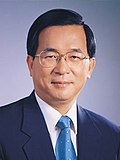| Constituency | Elected candidate(s) | Popular vote |
|---|
| Taipei City Constituency 1 | | Ting Shou-chung [ zh ] | 59.81% |
| Taipei City Constituency 2 | | Justin Chou | 52.39% |
| Taipei City Constituency 3 | | John Chiang | 60.25% |
| Taipei City Constituency 4 | | Alex Tsai | 62.25% |
| Taipei City Constituency 5 | | Lin Yu-fang | 58.24% |
| Taipei City Constituency 6 | | Diane Lee | 66.80% |
| Taipei City Constituency 7 | | Alex Fai | 65.79% |
| Taipei City Constituency 8 | | Lai Shyh-bao | 71.81% |
| Kaohsiung City Constituency 1 | | Huang Chao-shun | 58.29% |
| Kaohsiung City Constituency 2 | | Kuan Bi-ling | 48.84% |
| Kaohsiung City Constituency 3 | | Hou Tsai-feng [ zh ] | 49.13% |
| Kaohsiung City Constituency 4 | | Lee Fu-hsing | 51.32% |
| Kaohsiung City Constituency 5 | | Kuo Wen-chen [ zh ] | 46.01% |
| Taipei County Constituency 1 | | Wu Yu-sheng [ zh ] | 58.38% |
| Taipei County Constituency 2 | | Lin Shu-fen | 43.17% |
| Taipei County Constituency 3 | | Yu Tian | 49.51% |
| Taipei County Constituency 4 | | Lee Hung-chun  | 51.73% |
| Taipei County Constituency 5 | | Huang Chih-hsiung | 52.32% |
| Taipei County Constituency 6 | | Lin Hung-chih | 56.93% |
| Taipei County Constituency 7 | | Wu Chin-chih  | 55.82% |
| Taipei County Constituency 8 | | Chang Ching-chung | 59.55% |
| Taipei County Constituency 9 | | Lin Te-fu | 69.61% |
| Taipei County Constituency 10 | | Lu Chia-chen | 60.10% |
| Taipei County Constituency 11 | | Lo Ming-tsai | 69.69% |
| Taipei County Constituency 12 | | Lee Ching-hua | 51.96% |
| Keelung City | | Hsieh Kuo-liang | 67.79% |
| Yilan County | | Lin Chien-jung [ zh ] | 53.12% |
| Taoyuan County Constituency 1 | | Chen Ken-te [ zh ] | 61.76% |
| Taoyuan County Constituency 2 | | Liao Cheng-ching [ zh ] | 54.57% |
| Taoyuan County Constituency 3 | | John Wu | 63.22% |
| Taoyuan County Constituency 4 | | Yang Li-huan [ zh ] | 62.42% |
| Taoyuan County Constituency 5 | | Chu Fong-chi | 63.76% |
| Taoyuan County Constituency 6 | | Sun Ta-chien [ zh ] | 65.02% |
| Hsinchu County | | Chiu Ching-chun | 66.52% |
| Hsinchu City | | Lu Hsueh-chang [ zh ] | 60.61% |
| Miaoli County Constituency 1 | | Li Yi-ting | 58.01% |
| Miaoli County Constituency 2 | | Hsu Yao-chang | 45.62% |
| Taichung County Constituency 1 | | Liu Chuan-chung | 53.59% |
| Taichung County Constituency 2 | | Yen Ching-piao | 59.94% |
| Taichung County Constituency 3 | | Chiang Lien-fu [ zh ] | 54.95% |
| Taichung County Constituency 4 | | Shyu Jong-shyong | 64.00% |
| Taichung County Constituency 5 | | Yang Chiung-ying | 57.68% |
| Taichung City Constituency 1 | | Tsai Chin-lung [ zh ] | 61.29% |
| Taichung City Constituency 2 | | Lu Shiow-yen | 57.08% |
| Taichung City Constituency 3 | | Daniel Huang  | 54.91% |
| Changhua County Constituency 1 | | Chen Hsiu-ching | 44.96% |
| Changhua County Constituency 2 | | Lin Tsang-min [ zh ] | 60.02% |
| Changhua County Constituency 3 | | Cheng Ru-fen [ zh ] | 45.33% |
| Changhua County Constituency 4 | | Hsiao Ching-tien [ zh ] | 41.26% |
| Nantou County Constituency 1 | | Wu Den-yih | 67.12% |
| Nantou County Constituency 2 | | Lin Ming-chen | 57.93% |
| Yunlin County Constituency 1 | | Chiang Chia-chun [ zh ] | 56.24% |
| Yunlin County Constituency 2 | | Chang Sho-wen | 49.11% |
| Chiayi County Constituency 1 | | Wong Chung-chun | 57.47% |
| Chiayi County Constituency 2 | | Helen Chang | 57.05% |
| Chiayi City | | Chiang Yi-hsiung [ zh ] | 46.70% |
| Tainan County Constituency 1 | | Yeh Yi-jin [ zh ] | 54.57% |
| Tainan County Constituency 2 | | Huang Wei-cher | 59.16% |
| Tainan County Constituency 3 | | Lee Chun-yee | 52.66% |
| Tainan City Constituency 1 | | Chen Ting-fei | 50.27% |
| Tainan City Constituency 2 | | William Lai | 51.64% |
| Kaohsiung County Constituency 1 | | Chung Shao-ho  | 53.55% |
| Kaohsiung County Constituency 2 | | Lin Yi-shih | 55.27% |
| Kaohsiung County Constituency 3 | | Chen Chi-yu [ zh ] | 45.13% |
| Kaohsiung County Constituency 4 | | Chiang Ling-chun [ zh ] | 50.22% |
| Pingtung County Constituency 1 | | Su Chen-ching [ zh ] | 46.90% |
| Pingtung County Constituency 2 | | Wang Chin-shih [ zh ] | 56.82% |
| Pingtung County Constituency 3 | | Pan Men-an | 51.30% |
| Hualien County | | Fu Kun-chi  | 66.39% |
| Taitung County | | Justin Huang | 61.09% |
| Penghu County | | Lin Pin-kuan | 50.71% |
| Kinmen County | | Chen Fu-hai | 37.31% |
| Lienchiang County | | Tsao Erh-chung | 49.72% |
| Lowland Aborigine | | Liao Kuo-tung (Kuomintang)
Yang Jen-fu (Kuomintang)
Lin Cheng-er (林正二) (  People First Party) People First Party) | |
| Highland Aborigine | | Chien Tung-ming (Kuomintang)
Kung Wen-chi (孔文吉) (Kuomintang)
Kao Chin Su-mei (Non-Partisan Solidarity Union ) | |




